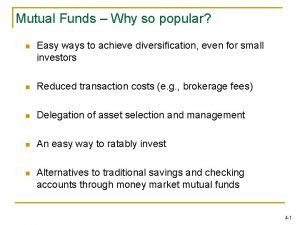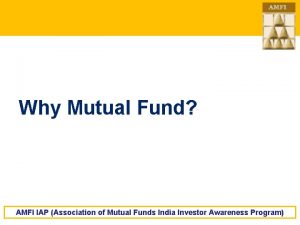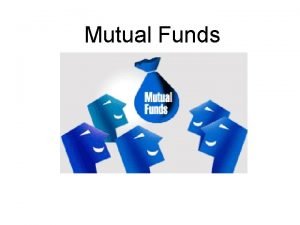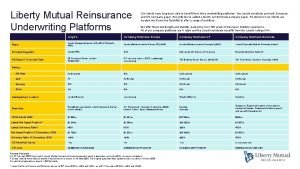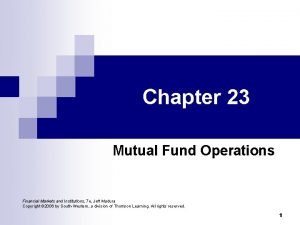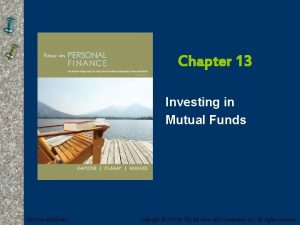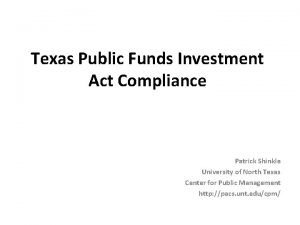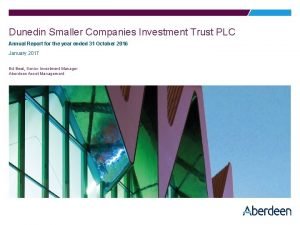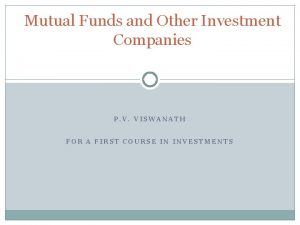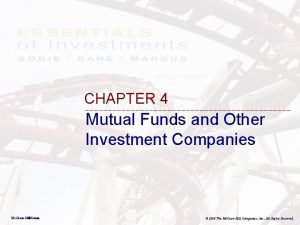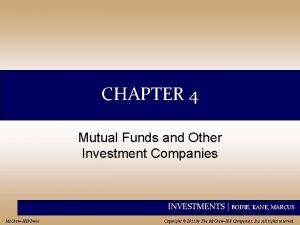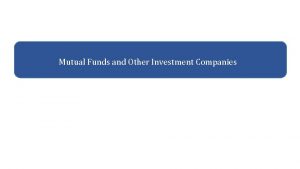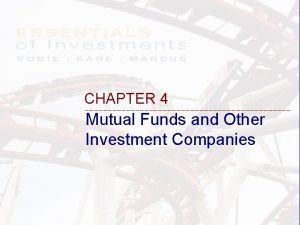Mutual Funds and Other Investment Companies Investment Companies













- Slides: 13

Mutual Funds and Other Investment Companies

Investment Companies § A corporation or trust engaged in the business of investing the pooled capital of investors in financial securities. This is most often done either through a closed-end fund or an open-end fund (also referred to as a mutual fund). § Financial intermediaries that collect money from individual investors and invest these funds in a wide range of securities or other assets § Perform important functions for individual investors including: 1) Diversification and Divisibility 2) Lower Transaction Fees 3) Record Keeping and Administration 4) Professional Management

Investment Companies § Value of each share is called the Net Asset Value or NAV (equals assets minus liabilities expressed on a per-share basis):

Types of Investment Companies § Open-end Investment Companies - This means that managers have to plan and manage the fund to be able to meet the demands for investors who may want their money back at any time. Open-ended funds are often restricted to investing in liquid assets, in other words investments that can be sold at short notice. Commonly known as Mutual Funds - Stands ready to redeem or issue shares at NAV - May have “front-load” or “rear-end” sales charges (capped at 8. 5% by NASD) - Number of shares constantly changes

Types of Investment Companies § Closed-end Funds - Number of shares is fixed - Does not redeem or issue shares - Typically, newly issued shares sell for a premium over the NAV - Shortly after being issued, many shares sell at a discount from NAV - A puzzle that much recent financial research has focused on - Usually traded on organized exchanges

Types of Investment Companies § Unit Investment Trusts - Pools of money invested in a portfolio that is fixed for the life of the fund - Units (also called redeemable trust certificates) sold by a sponsor (brokerage firm) to individual investors - Most unit trusts hold fixed-income securities (bonds, etc. ) and expire at their maturity - Most unit investment trusts are invested in tax-exempt securities (municipal bonds) - Individuals may sell units back to trustee at NAV

Types of Investment Companies § Commingled Funds - Used by trust departments among others - Partnership of investors that pool their funds with a management firm (e. g. , bank) - Similar to open-end funds except units are traded rather than shares

Types of Investment Companies § Real Estate Investment Trusts (REITs) - Similar to a closed-end fund - Invest in real estate or loans secured by real estate - Exempt from taxes as long as at least 95% of their taxable income is distributed to shareholders; however, these distributions (dividends) are taxable as personal income

Mutual Funds Types § Money Market Funds § Equity Funds: 1) Maximum Capital Gain 2) Growth 3) Growth and Income 4) Income 5) Income and Security

Mutual Funds Types § Fixed-Income Funds § Balanced and Income Funds § Asset Allocation Funds § Index Funds § Special Sector Funds § International Funds

Mutual Fund Returns

Taxation of Mutual Fund Income § Granted “pass-through status” (i. e. , taxes paid by investor in the fund, but not by the fund itself) if the fund meets certain requirements including: 1) At least 90% of all income is distributed to shareholders (in order to avoid “excise tax”, fund must distribute 98% of income in the calendar year in which it was earned) 2) Fund receives less than 30% of its gross income from sale of securities held for less than three months 3) Fund must meet diversification criteria

Mutual Fund Performance Benchmark § Benchmark for the performance of equity fund managers is the rate of return on the Wilshire 5000 Index (a value-weighted index of about 7000 stocks that trade on the NYSE and Amex stock exchanges, and the Nasdaq stock market § Useful benchmark to evaluate professional fund managers because it corresponds to a simple passive investment strategy; however, an imperfect comparison due to: 1) Risk Differential: the risk of the Wilshire 5000 Index may differ significantly from the risk of a specific fund 2) Expenses: a specific fund will incur expenses (e. g. , transaction costs, etc. ) that the Wilshire 5000 Index is not exposed to
 Mutual funds examples
Mutual funds examples Iap mutual funds
Iap mutual funds Mutual funds disclaimer
Mutual funds disclaimer Mutual funds disclaimer
Mutual funds disclaimer Meritas mutual funds
Meritas mutual funds Reinsurance mutual funds
Reinsurance mutual funds Mutual funds operations
Mutual funds operations Aim mutual funds
Aim mutual funds Mutual funds market watch
Mutual funds market watch Chapter 13 investing in mutual funds
Chapter 13 investing in mutual funds Public funds investment act training
Public funds investment act training Agricultural investment funds for developing countries
Agricultural investment funds for developing countries Dunedin smaller companies
Dunedin smaller companies Fixed investment and inventory investment
Fixed investment and inventory investment
